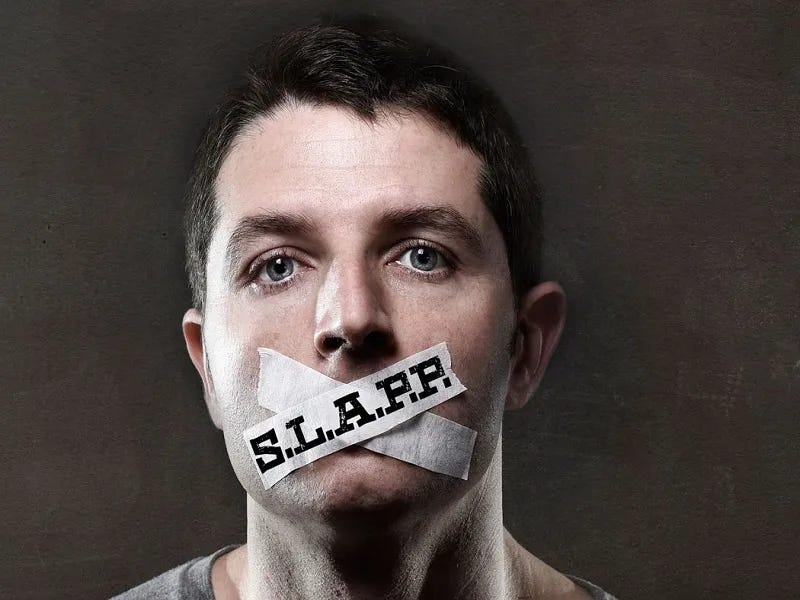EXCLUSIVE: "Larry Gross, ex-Bass, Garcetti Commish, Ordered to Pay $73,500 for Failed Defamation Suit Against Fired Dog Pound Whistleblower" by Daniel Guss
His victorious target, Joy Freiberg, wins the crown of indelibly righteous heroism
Until last year, Larry Gross spent a decade on the LA Animal Services (LAAS) commission.
As commission president, Gross behaved as if he were holding court. He presided over commission meetings with a joviality many described as inconsistent with its deadly, but preventable, challenges, detached from the pleas and tears of the volunteers, rescuers, staffers and members of the public who attended meetings of the agency which was historically manipulated and controlled by the mayors’ office. In that regard, Gross was a good soldier… for the mayors, Karen Bass and Eric Garcetti, who kept him there.
Generally, appointees last a long time when they make mayors look good, whether by excellence or duplicity. And lasting a long time is good for business.
Hang-on to that notion.
Eventually, Joy Freiberg, a public safety official for the City of West Hollywood and a former legislative correspondent for California Senator Barbara Boxer, who regularly volunteered in the deadly LAAS pounds, had enough.
As Freiberg would later describe in her legal declaration, she informed her LAAS supervisors about the excessive killing of healthy, adoptable animals and the chronic misspending of money, but none of them did anything about it. She reached out to public officials and used social media to criticize Gross’s leadership — or lack of leadership — that resulted in what Freiberg considered atrocities committed against the animals LAAS was charged with protecting.
In response to Freiberg’s whistleblowing efforts to inform the public on what was going on in the City’s animal pounds, LAAS fired her. But she continued her activism on behalf of the animals who she believed were being mistreated, including organizing a large public protest.
Gross responded by suing Freiberg, asking the court to order Freiberg to pay Gross “not less than $250,000” and “enjoining Defendant from repeating any statements found to be defamatory.” Gross threatened to ask the court to award him $1,000,000 in punitive damages.
Enter Paul Nicholas Boylan, an attorney specializing in enforcing the First Amendment, who is also a public records expert. Boylan agreed to represent Freiberg, and filed an anti-SLAPP motion asking the court to dismiss Gross’s lawsuit.
If Boylan’s name sounds familiar, it may be because he specializes in advising journalists and news media outlets, and represents them when they get sued for defamation. He is the recipient of the California News Publishers Association’s “Free Speech Award” and the Society of Professional Journalists’ “First Amendment Career Achievement Award.” He has served as a professor of law in California and in Europe, and has been an invited and guest speaker at business schools, law schools and law firms all over the world.
Boylan has also been an invaluable legal resource and friend of this column. Much of what is exposed on DanielGuss.Substack.com is a direct reflection of his expertise, generosity and availability.
He and Freiberg are civic heroes to me.
Anti-SLAPP: How Boylan Beat Gross, and How Gross Then Made Things Worse for Himself
An anti-SLAPP motion is a common legal response for defendants in some legal matters, including (but not limited to) defamation lawsuits.
It involves deeply technical legal arguments in which a party being sued (Freiberg) alleges (1) that the reason she is being sued is because she spoke-out in furtherance of her right of petition or free speech under the United States Constitution or the California Constitution in connection with a public issue; and (2) the party suing her (Gross) has a hidden agenda of trying to silence her through intimidation of her protected criticisms. “Anti” refers to Freiberg’s effort to stop Gross’s Strategic Lawsuit Against Public Participation, or SLAPP.

Freiberg’s legal declaration includes as evidence, filed separately, scores of columns that I wrote about the corruption, suffering and failure at LAAS. While the LA news media and politicians have for years refused to report or act on my findings, they were front and center in Boylan’s defense of Freiberg.
As the Court’s final ruling shows, Boylan’s anti-SLAPP motion eviscerated Gross’s defamation lawsuit on each and every legal point, which is why Gross was ordered to pay $73,497.84* to Boylan.
We will get to that asterisk in a moment.
“…Defendant has submitted substantial evidence demonstrating the foundation for her criticisms of Plaintiff… She also submitted evidence in support of her claims that donated funds had been misappropriated showing that funds were regularly diverted from animal care to cover marketing, public relations, staff trips, and other expenses… Defendant offered numerous examples of her protests and complaints about the mistreatment of animals, deplorable animal shelter conditions, and inhumane euthanasia practices made to Plaintiff, his fellow commissioners, and other public officials, and recounts the failure of Plaintiff and others to remedy these conditions for years… Based on Defendant’s substantial showing, the Court cannot find that she believed much less “knew” that her statements were false or that she subjectively entertained any serious doubts that the accusations she launched at Plaintiff were truthful.”
Judge Theresa M. Traber
Excerpt from ruling on Larry Gross v. Joy Freiberg
Boylan winning his anti-SLAPP motion not only meant the end of Gross’s defamation lawsuit, winning the deeply technical legal arguments meant that Gross would have to pay Boylan for defending Freiberg and getting Gross’s complaint dismissed as a SLAPP.
Boylan won on all of them.
Consequently, Gross was ordered to pay Boylan $61,659.10 (attorney fees plus ten percent interest).
While Freiberg is not eligible to receive any of Gross’s money, she wins permanent #Badass status and the crown of indelibly righteous heroism.
Gross Made Continually Poor Decisions
As I previewed last March in “A Gross Abuse” and last April in “Anti-SLAPPED! Why a City Hall Operative Will Soon Cough-Up Cash,” Gross dug a hole for himself and kept making it worse.
Gross could have dropped his lawsuit against Freiberg with little, if any, consequence, but did not. The deeper he dug-in, and the harder he fought to use legal process to punish Freiberg for exercising her rights to petition and speak on issues of public importance, the more Gross was going to pay.
When Boylan’s anti-SLAPP won on every legal point, Gross pursued an appeal, which meant that if it failed, Gross would also be on the hook for costs and attorney fees associated with Boylan having to respond to Gross’s appeal on Freiberg’s behalf.
And now back to that asterisk.
Gross’s appeal did not fail.
He aborted it. He didn’t dismiss it. He abandoned it, which meant that Gross was on the hook for Boylan’s fees and costs on appeal, which the judge determined to be an additional $11,838.74, for a total of $73,497.84.
All of this happened because Gross attempted to use our county court system to silence one of his critics — and failed.
Which seems to have been the inevitable result.
“It is a well-established truth, fundamental to our democracy, that it is in the public interest to encourage people to participate in matters of public significance, and that this participation should not be chilled through abuse of the judicial process,” Boylan told me. “California’s anti-SLAPP statute was enacted because the Legislature saw a disturbing increase in lawsuits brought primarily to chill the valid exercise of the constitutional rights of freedom of speech and petition for the redress of grievances.”
“Mr. Gross’s lawsuit against Ms. Freiberg fits the description of a SLAPP so clearly that I cannot understand how he could have even imagined he would get away with it,” Boylan continued. “Gross paid a high price for rolling dice loaded in Ms. Freiberg’s favor the moment she began to participate in the public debate about abuses within the City’s animal welfare system.”
A Curious Choice for Bass, Garcetti, Unless You Understand LA City Hall
By almost every measure, the City of Los Angeles is the worst local government in the United States.
The Great Los Angeles Inferno in January — A billion-dollar budget deficit — Scandal at the LAFD, LAPD, LADWP, LAAS and now even Parking Enforcement — Vague non-profits and Non-Government Organizations, NGOs, including one that allegedly used millions of taxpayer dollars to fund gang crime rather than stopping it — And its specialty: self-destructive politicians like Bass, Garcetti, Antonio Villaraigosa, Nury Martinez, Kevin de León, Gil Cedillo, Mitch Englander, Jose Huizar, Mark Ridley-Thomas and Curren Price.
But City Hall disappoints in less visible ways, too.
Larry Gross’s long tenure on the LAAS commission is a good example, because his claimed expertise is tenants’ rights issues, which is certainly an important subject. So why did Bass and Garcetti have him spend a decade at LAAS rather than in his area of expertise?
It is unclear.
I have an opinion based on the following facts, which I believe are true, but you are free to draw your own conclusions:
Gross is the Executive Director of the Coalition for Economic Survival (CES)
According to its most recent tax return, 80% of CES’s budget comes from government grants intended for “helping tenants with housing problems and housing needs.”
Gross is the only salaried member of the CES board, and his $45,150 salary was the equivalent of approximately 14% of the most recent report on its grant money.
Gross is also a local District Director for the California Democratic Party, though it is unclear whether he receives a salary for it. His social media accounts are littered with anti-Trump, anti-Musk and, now, anti-Chuck Schumer memes, including many in which animals ironically espouse leftist social justice political views.
Gross “resigned” from the LAAS commission after a series of catastrophes, including my ‘23 exposé on his use of undisclosed email accounts — including some belonging to CES — for clandestine communications about LAAS rather than exclusively for tenants’ rights issues; the hideous degradation at LAAS; and subsequently, the $563,250 CalOSHA fine resulting from a long-time LAAS employee almost losing her life in 2024 after being brutally mauled in the Harbor pound.
Whatever the reason, Gross was replaced on the commission by someone who repeatedly said that he had no interest in being there, and whose infamous departure one meeting later won’t be forgotten any time soon.
And that guy was replaced by someone who admitted during his City Council “vetting” that he knew nothing about LAAS and whose dog did not have a current license.
Whether that’s an improvement is a matter of opinion.
There was a moment of phenomenal serendipity and good timing in this story that took place high-above Los Angeles, the City of Angels, one day.
Was it the universe speaking-up on behalf of voiceless animals who were long overdue for a miracle to protect their protector, Joy Freiberg?
I have an opinion on that, too, but will leave this one to your imagination…
(Daniel Guss, MBA, won the LA Press Club’s “Online Journalist of the Year” and “Best Activism Journalism” awards in June ‘23. In June ‘24, he won its “Best Commentary, Non-Political” award. He has contributed to the Daily Mail, CityWatchLA, KFI AM-640, iHeartMedia, 790-KABC, Cumulus Media, KCRW 89.9 FM, KRLA 870 AM, Huffington Post, Los Angeles Daily News, Los Angeles Magazine, Movieline Magazine, Emmy Magazine, Los Angeles Business Journal, Pasadena Star-News, Los Angeles Downtown News and the Los Angeles Times in its sports, opinion, entertainment and Sunday Magazine sections among other publishers.)






